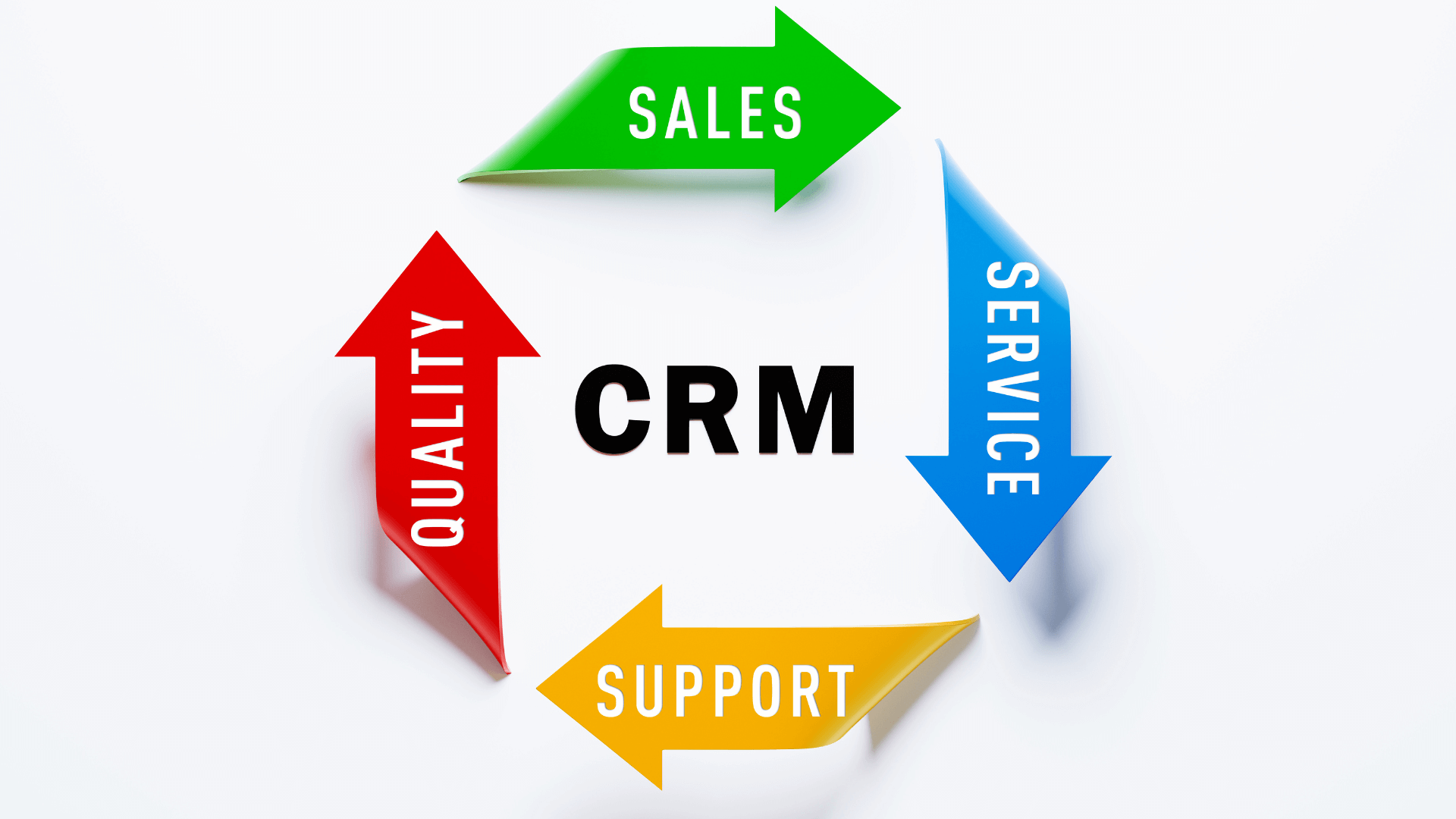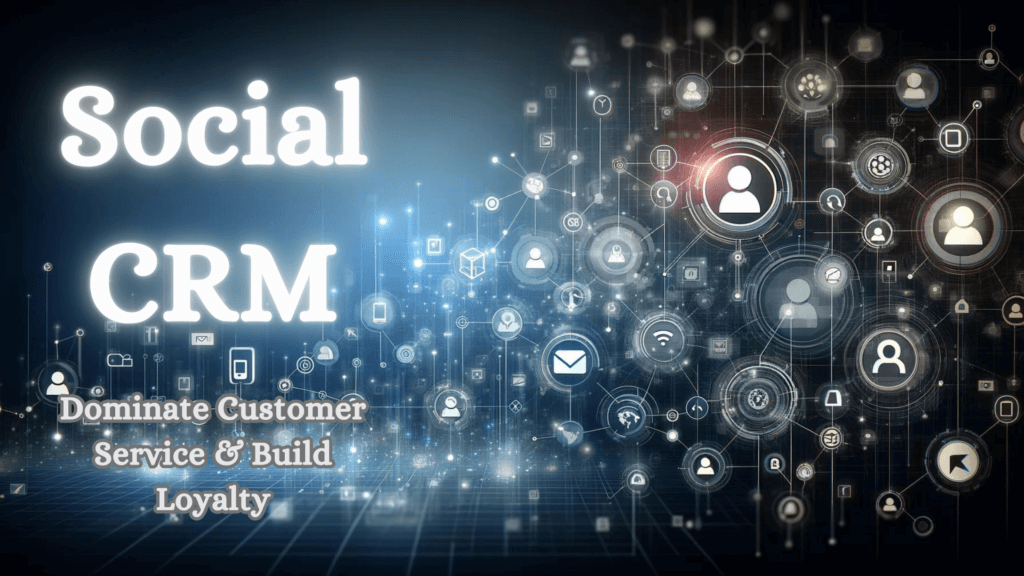The Power of Connection: Introducing Social CRM
Customer interaction has experienced a dramatic shift. Social media platforms have become bustling online communities where people connect, share experiences, and voice their opinions. For businesses, this presents both a challenge and an opportunity.
The challenge lies in keeping pace with this ever-evolving communication. Traditional methods of customer relationship management (CRM) may no longer suffice. However, the opportunity lies in harnessing the power of social media to connect with customers on a deeper level, address their concerns promptly, and build lasting relationships.
It is where Social CRM steps in. It’s a strategic approach to customer relationship management that integrates the dynamic world of social media into the core of your CRM system. By actively listening to customer conversations on social media platforms, businesses can gain valuable insights, improve customer service, and ultimately, cultivate a thriving online community around their brand.
What is Social CRM?
Imagine a customer having a question about your product and taking to Twitter to ask it. Social CRM allows you to see that question, respond directly, and potentially turn that interaction into a positive customer experience. In essence, Social CRM is a customer relationship management strategy built for the age of social media.

Here’s a breakdown of the main features of Social CRM:
- Social Listening: It involves actively monitoring social media platforms for mentions of your brand, industry trends, and competitor activity. Think of it as having your ear to the ground in the online world.
- Engagement: Social CRM isn’t just about listening. It’s about actively participating in conversations. It means responding to customer comments and messages promptly, addressing concerns politely, and even joining relevant discussions to showcase your expertise.
- Relationship Building: Social media provides a unique opportunity to connect with customers individually. Through engaging content, contests, and promotions, Social CRM helps businesses build relationships, foster brand loyalty, and create a community of enthusiastic supporters.
Now, let’s compare Social CRM to its predecessor, Traditional CRM:
| Feature | Traditional CRM | Social CRM |
|---|---|---|
| Focus | Offline interactions | Social media interactions |
| Communication Channels | Phone, email | Social media platforms |
| Data Source | Customer records | Social media conversations, reviews |
| Customer Engagement | Limited | More interactive |
While Traditional CRM remains vital for managing internal data, Social CRM extends your reach into the online world, allowing you to connect with customers where they are most active.
Why Social CRM Matters in Today’s Digital World
Social media has become an undeniable force in our daily lives. It’s the go-to platform for people to connect, share experiences, and increasingly, voice their opinions about brands. Imagine a customer having a fantastic experience with your product and raving about it on Twitter. Now imagine the opposite scenario – a customer frustrated with your service venting their concerns on Facebook. In today’s digital world, where information travels fast, customer sentiment on social media can significantly impact your brand image.
It is precisely why Social CRM is no longer an optional add-on; it’s a critical tool for businesses of all sizes. Here’s how Social CRM empowers businesses to thrive in the age of social media:
- Enhanced Customer Engagement: Social media provides a unique opportunity to have two-way conversations with your customers. Through Social CRM, you can actively engage your audience by responding to comments and messages, participating in relevant discussions, and running interactive contests or polls. It fosters a sense of community and keeps your brand at the forefront of your customers’ minds.

- Real-time Feedback and Social Listening: Social media platforms are a constant stream of customer feedback – both positive and negative. Social CRM tools allow you to monitor brand mentions and industry trends in real time. This invaluable information helps you identify potential issues before they escalate, address customer concerns promptly, and gain insights into customer preferences and buying behavior.

- Improved Customer Service and Support: Social media allows customers to connect with brands directly. Social CRM empowers you to provide exceptional customer service by addressing concerns and resolving issues efficiently on the platform where they arise. It demonstrates responsiveness and builds trust with your customer base.

- Building a Community Around the Brand: Social CRM goes beyond just managing customer interactions. It’s about fostering a community of loyal brand advocates. By creating engaging content, running contests, and interacting with your audience on a personal level, you can build a strong connection with your customers. This loyal community can become brand champions, spreading positive word-of-mouth and promoting your products or services organically.

- Targeted Marketing and Personalized Communication: Social listening through Social CRM allows you to understand your audience’s interests and preferences. This valuable data can be used to create targeted marketing campaigns and personalize communication with your customers. Imagine sending birthday greetings to customers or recommending products based on their past purchases – these small touches can go a long way in building stronger relationships.

In essence, Social CRM bridges the gap between traditional customer relationship management and the ever-evolving world of social media. By embracing Social CRM, businesses can connect with customers on a deeper level, build stronger relationships, and ultimately achieve sustainable success in today’s digital world.
Putting Social CRM into Action: A Step-by-Step Guide
So, you’re convinced of the power of Social CRM and ready to take the plunge. Here’s a roadmap to get you started:
- Define Your Goals: The first step is to identify your specific goals for using Social CRM. Do you want to improve customer service response times? Increase brand awareness? Generate leads? Having clear goals will guide your overall strategy and help you measure success later on.
- Choose Your Social CRM Tools: Several types of social CRM tools can help you manage your online presence. Here are a few key options:
- Social Media Listening Tools: These tools track brand mentions, industry trends, and competitor activity across various platforms.
- Social Media Management Tools: These platforms allow you to schedule posts, manage multiple social media accounts, and track engagement metrics.
- Customer Service Helpdesk Software: Integrating your CRM system with a helpdesk can streamline communication and track customer interactions across different channels.
- Set Up Social Listening: Once you have your tools in place, set up monitoring for relevant keywords and hashtags. It might include your brand name, product name, industry terms, and even competitor mentions. By staying informed about online conversations, you can identify potential customer issues and opportunities for engagement.
- Craft Your Response Strategy: Develop clear guidelines for how your team will respond to comments and messages on social media. It includes setting response timeframes, maintaining a consistent brand voice, and addressing both positive and negative feedback professionally and courteously.
- Create Engaging Content: Social media is a two-way street. Don’t just broadcast messages; create engaging content that sparks conversations with your audience. It could be anything from informative blog posts and eye-catching visuals to interactive polls and behind-the-scenes glimpses into your company culture.
- Track and Analyze: Social CRM is an ongoing process. Regularly track key metrics like follower growth, engagement rates, and customer sentiment. Analyze this data to see what’s working and what needs improvement. By continually refining your strategy, you can maximize the effectiveness of your Social CRM efforts.
Remember, Social CRM is a journey, not a destination. By following these steps and adapting them to your specific needs, you can build a strong foundation for connecting with your customers online and fostering lasting relationships in the ever-evolving world of social media.
Mastering Social CRM: Best Practices for Success
Social CRM isn’t just about having a presence on social media. It’s about building genuine connections with your customers in this dynamic online space. Here are some key practices to keep your Social CRM efforts customer-centric and effective:
- Put the Customer at the Center: Social CRM is all about your customers. Tailor your content strategy and interactions to their needs and interests. Respond to comments and messages promptly, address concerns politely, and actively seek feedback to understand their pain points and preferences. Remember, happy customers are your best brand ambassadors.
- Be Proactive in Communication: Don’t wait for customers to come to you. Be proactive in initiating conversations. Share informative content, participate in relevant discussions, and run interactive polls or contests. It keeps your brand engaged with your audience and demonstrates a willingness to connect.
- Personalization is Key: Social listening through Social CRM allows you to gather valuable data about your customers’ interests and online behavior. Use this information to personalize your communication. For example, send birthday greetings or recommend products based on past purchases. These small touches show your customers you value them as individuals.
- Stay Ahead of the Curve: Social media trends move fast. Regularly monitor what’s happening on different platforms and adapt your strategy accordingly. What kind of content resonates with your audience? What new features are popular? Keep your finger on the pulse of social media to stay relevant and connect with your customers where they are most active.
- Embrace Customer Feedback: Social media provides a platform for customers to share their thoughts and experiences with your brand. Encourage this feedback by asking questions, running polls, and actively listening to what your audience has to say. Responding to both positive and negative feedback demonstrates your commitment to customer satisfaction and helps you identify areas for improvement.
By following these best practices, you can create a winning Social CRM strategy that promotes stronger customer relationships, builds brand loyalty, and drives business growth.
Challenges and Considerations for Social CRM
While Social CRM offers a wealth of benefits, it’s not without its challenges. Here are some key considerations to keep in mind:
- Data Privacy and Security Concerns: Social CRM relies on collecting and analyzing customer data from social media platforms. It’s crucial to prioritize data privacy and security. Ensure you have clear policies in place regarding data collection, storage, and usage. Be transparent with customers about how their information is being used and adhere to all relevant data privacy regulations.
- Managing Customer Expectations on Social Media: Customers on social media expect prompt and personalized responses. However, managing a constant stream of comments and messages can be overwhelming. Develop a social media response strategy that outlines clear response times and guidelines for handling different types of inquiries. It’s important to set realistic expectations while still providing excellent customer service.
- Keeping Up with the Ever-Changing Social Media Landscape: The social media landscape is constantly evolving. New platforms emerge, features change, and user preferences shift. Stay informed about the latest trends and adapt your Social CRM strategy accordingly. Allocate resources to monitor new developments and ensure your social media presence remains fresh and relevant.
- Measuring ROI of Social CRM Efforts: Demonstrating the return on investment (ROI) of your Social CRM efforts can be tricky. Focus on key metrics like follower growth, engagement rates, customer sentiment analysis, and website traffic generated from social media. By tracking these metrics over time, you can assess the effectiveness of your strategy and identify areas for improvement.
Remember, Social CRM is a journey, not a destination. By acknowledging these challenges and implementing thoughtful strategies, you can navigate the ever-changing social media landscape and maximize the benefits of Social CRM for your business.
The Future of Social CRM
The world of social media is constantly evolving, and Social CRM is no exception. As technology advances and customer expectations shift.

Here’s a glimpse into what the future might hold for Social CRM:
- Evolving Customer Relationships: The customer journey is becoming increasingly complex and non-linear. Social CRM will need to adapt to accommodate these changes. Expect to see a focus on building deeper, more personalized relationships with customers. Imagine AI-powered chatbots providing real-time support or social listening tools that identify potential brand advocates for targeted engagement.
- Impact of Emerging Technologies: Emerging technologies like Artificial Intelligence (AI) and machine learning (ML) are poised to significantly impact Social CRM. AI-powered chatbots can handle routine inquiries, freeing up human resources to focus on complex issues. Machine learning can analyze vast amounts of social media data to identify customer trends and sentiment, allowing businesses to tailor their strategies accordingly.
- Integration with Other Digital Marketing Strategies: Social CRM will become even more integrated with other digital marketing strategies. Imagine using social media insights to inform your content marketing strategy or personalize email campaigns based on customer interactions on social platforms. A seamless, omnichannel experience will be key to building lasting customer loyalty.
Here are some additional predictions for the future of Social CRM:
- Focus on Visual Content: Social media is increasingly becoming a visual platform. Expect to see a growing emphasis on using engaging visual content like videos, infographics, and live streams to connect with customers.
- The Rise of Influencer Marketing: Social media influencers hold significant sway with their audiences. Social CRM will likely play a role in identifying and collaborating with relevant influencers to promote products or services authentically.
- The Power of Communities: Social media communities can be a powerful tool for fostering brand loyalty. Look for Social CRM strategies to focus on building and nurturing online communities around brands, creating a space for customers to connect and share experiences.
By embracing these potential advancements and staying adaptable, businesses can leverage Social CRM to build stronger customer relationships, create a more personalized customer experience, and ultimately achieve lasting success in the ever-evolving digital landscape.
Conclusion
Customers are actively engaged on social media platforms, sharing experiences, voicing opinions, and seeking connections with brands in today’s digital age. Social CRM emerges as a powerful strategy to navigate this online world.
Here’s a quick recap of the key takeaways:
Bridging the Gap: Social CRM bridges the gap between traditional customer relationship management and the ever-evolving world of social media. It allows businesses to connect with customers on a deeper level, fostering stronger relationships and building a loyal online community.
Benefits Galore: Social CRM offers a wealth of benefits for businesses. It empowers you to improve customer service, enhance brand reputation, gain valuable customer insights, and ultimately drive sustainable growth.
A Two-Way Street: Social CRM isn’t just about broadcasting messages; it’s about fostering two-way conversations. Engaging content, responsive interactions, and active listening are key to building lasting connections with your audience.
The Takeaway: Building Your Social Presence
Building a strong social media presence is no longer optional; it’s essential for business success. By implementing an effective Social CRM strategy, you can connect with your customers on a more personal level, gather valuable feedback, and create a thriving online community. Remember, Social CRM is an ongoing journey. Regularly analyze your results, refine your approach, and stay adaptable to the ever-changing social media landscape.
Looking to Learn More?
Here are some additional resources for readers who want to delve deeper into the world of Social CRM:
- Social CRM software provider websites offering detailed information and case studies
- Online courses and webinars on Social CRM best practices
By embracing Social CRM, businesses can unlock the power of social media and build lasting connections with their customers in the ever-evolving digital world.
Frequently Asked Questions (FAQs) about Social CRM
- What is Social CRM?
- Social CRM is a customer relationship management (CRM) strategy that integrates social media interactions into your overall CRM system. It allows businesses to connect with customers on social media platforms, listen to their conversations, and address their needs directly.
- Why is Social CRM important?
- Social media is where customers are actively sharing experiences and opinions. Social CRM helps businesses be present in these conversations, improve customer service, build brand loyalty, and gain valuable customer insights.
- What are the benefits of Social CRM?
- Enhanced customer service and support
- Improved customer engagement
- Real-time customer feedback and social listening
- Targeted marketing and personalized communication
- Building a community around your brand
- What are the key features of Social CRM?
- Social listening: Monitoring brand mentions, industry trends, and competitor activity.
- Engagement: Responding to comments and messages, participating in discussions.
- Relationship building: Creating engaging content, running contests, fostering connections.
- How does Social CRM differ from Traditional CRM?
- Traditional CRM focuses on offline interactions and internal data, while Social CRM extends your reach into the online world of social media interactions and conversations.
- What are some Social CRM tools?
- Social media listening tools: Track brand mentions and industry trends.
- Social media management tools: Schedule posts, manage accounts, and track engagement.
- Customer service helpdesk software: Streamline communication and track interactions.
- How do I get started with Social CRM?
- Define your goals: Improve response times, brand awareness, lead generation?
- Choose your tools: Social listening, management, helpdesk software.
- Set up social listening: Monitor relevant keywords and hashtags.
- Craft a response strategy: Set response times and maintain brand voice.
- How can I create engaging content for Social CRM?
- Informative blog posts & eye-catching visuals
- Interactive polls & behind-the-scenes glimpses
- Content that sparks conversations with your audience
- What are some Social CRM best practices?
- Put the customer at the center: Respond promptly, address concerns, seek feedback.
- Be proactive in communication: Share content, participate in discussions.
- Personalize communication: Use social listening data to tailor messages.
- How do I measure the success of my Social CRM efforts?
- Track key metrics: Follower growth, engagement rates, customer sentiment.
- Analyze data to see what’s working and what needs improvement.
- Regularly refine your Social CRM strategy.
- What are some challenges of Social CRM?
- Data privacy and security concerns: Prioritize data security and transparency.
- Managing customer expectations: Set realistic expectations for response times.
- Keeping up with the changing social media landscape: Adapt your strategy to new trends.
- How will Social CRM evolve in the future?
- Focus on deeper, more personalized customer relationships with AI chatbots & social listening tools.
- Impact of emerging technologies: AI and machine learning will analyze data and personalize experiences.
- Integration with other digital marketing strategies: Social media insights informing content marketing.
- What is the role of influencer marketing in Social CRM?
- Social CRM can help identify relevant influencers to collaborate with and promote products or services authentically.
- How can Social CRM help build online communities?
- Social CRM strategies can focus on building and nurturing online communities around brands, creating spaces for customer connection and experience sharing.
- Is Social CRM a good investment for any size business?
- Social CRM is a valuable tool for businesses of all sizes. Building a strong social media presence is essential for business success in today’s age.




